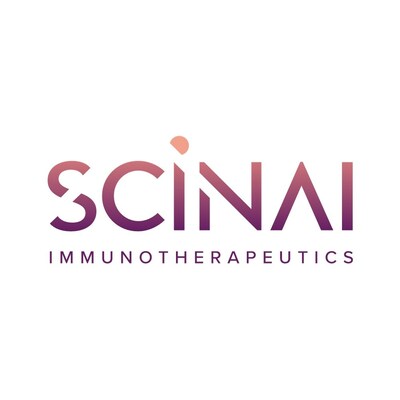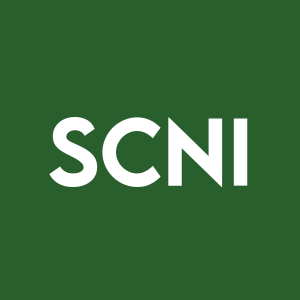Scinai Announces New Peer-Reviewed Publication Supporting PC111 as a Disease-Modifying Therapy for Pemphigus and SJS/TEN
Rhea-AI Summary
Scinai Immunotherapeutics (NASDAQ:SCNI) announced a new peer-reviewed publication validating PC111, their first-in-class human anti-Fas Ligand monoclonal antibody, as a potential disease-modifying therapy for pemphigus and SJS/TEN. The research, published in the Journal of Dermatological Treatment, demonstrates PC111's ability to prevent blister formation across multiple study models.
The study confirms PC111's unique non-immunosuppressive mechanism, acting locally at the keratinocyte level. The treatment represents a market opportunity exceeding $1 billion annually. Scinai and Pincell plan to advance PC111 through IND-enabling studies, with potential market entry in 3-4 years. The program may receive up to 80% cost coverage through a €15 million FENG grant, pending Q3 2025 decision.
Positive
- PC111 demonstrated efficacy in preventing blister formation across in-vitro, ex-vivo, and in-vivo models
- Treatment offers unique non-immunosuppressive mode of action with potentially faster action and better safety profile
- Market opportunity exceeds $1 billion annually across both indications
- Potential 80% cost coverage through €15 million FENG grant
- Already received EU orphan drug designation
- Accelerated approval pathway could enable market entry within 3-4 years
Negative
- Final decision on €15 million FENG grant still pending
- Acquisition of Pincell by Scinai not yet finalized
- Program still in pre-clinical stage requiring significant development work
News Market Reaction
On the day this news was published, SCNI declined 2.44%, reflecting a moderate negative market reaction. Argus tracked a peak move of +95.4% during that session. Argus tracked a trough of -45.2% from its starting point during tracking. Our momentum scanner triggered 39 alerts that day, indicating elevated trading interest and price volatility. This price movement removed approximately $86K from the company's valuation, bringing the market cap to $3M at that time. Trading volume was exceptionally heavy at 543.6x the daily average, suggesting significant selling pressure.
Data tracked by StockTitan Argus on the day of publication.
New data builds on award-winning research and confirms efficacy and safety of PC111 across in-vitro, ex-vivo, and in-vivo humanized models

Authored by Dr. Roberta Lotti and colleagues from the University of Modena and Pincell Srl, the paper expands on Dr. Lotti's prior award-winning research that earned the "Oscar of Italian Dermatology" and was highlighted in Scinai's June 26 press release. The new publication "Treatment of pemphigus and other neglected skin conditions with PC111 a human anti-Fas Ligand monoclonal antibody: a potential disease modifier" confirms PC111's ability to prevent blister formation in in vitro, ex vivo, and in vivo humanized models of pemphigus by targeting soluble Fas Ligand (sFasL), a key effector of keratinocyte apoptosis and acantholysis.
Scientific and Translational Advancement
Building upon prior ex vivo studies, the research introduces new data from a proprietary humanized FasL mouse model, in which PC111 significantly reduced disease activity. Collectively, the data confirms PC111's unique, non-immunosuppressive mode of action: acting locally at the keratinocyte level and downstream of the immune system.
In addition to pemphigus, the authors highlight PC111's promise in SJS/TEN, a life-threatening dermatological emergency. Preclinical models show PC111 prevents FasL-mediated keratinocyte apoptosis and ocular damage, indicating potential for early intervention in this high-mortality condition.
Unmet Need and Market Potential
Current treatments for pemphigus and SJS/TEN rely on chronic, systemic immunosuppression. In pemphigus, this typically includes steroids and Rituximab, which are slow-acting and associated with serious side effects. Other approaches—including BTK and FcRn inhibitors—have failed in late-stage development.
By targeting the final step in disease pathology rather than suppressing the immune system, PC111 offers a differentiated, fast-acting, and safer therapeutic profile. Combined, the two indications represent an annual market opportunity exceeding
Development Path and Strategic Outlook
Subject to Scinai's exercise of its option to acquire Pincell, the two companies plan to advance PC111 through IND-enabling studies and into clinical development. PC111 has already been granted orphan drug designation in the EU, and a similar status will be pursued also in the
Risk-Mitigating Program Structure
Scinai and Pincell have embedded several strategic advantages into the PC111 program:
- Expert Leadership: The PC111 program is led by its inventor, Prof. Carlo Pincelli (CMO, Pincell), together with Dr. Antonino Amato (CEO, Pincell), Dr. Roberta Lotti (Senior Researcher and Project Manager), and Dr. Brydon Bennett (CSO, Pincell). They are supported by Scinai's Scientific Advisory Board, which includes Prof. Michael Schön and Dr. Jonathan Sadeh, both recognized leaders in dermatology and immunotherapy.
- Robust Evidence: PC111's efficacy is supported by multiple peer-reviewed publications, most notably the award-winning 2023 Frontiers in Immunology article and a new 2025 publication in the Journal of Dermatological Treatment.
- Non-Dilutive Funding: Pending a final decision expected in the third quarter of 2025, Scinai may receive up to
80% cost coverage through a€15 million FENG grant to support development through IND readiness. - Regulatory Strategy: The combination of orphan designation, high unmet medical need, and a well-defined mechanism of action supports a realistic path toward Breakthrough Therapy designation and/or Accelerated Approval.
CEO Statement
"This new publication further validates our conviction that PC111 has the potential to transform the treatment landscape for pemphigus and SJS/TEN," said Amir Reichman, CEO of Scinai. "The scientific leadership and development expertise of the Pincell's team have been instrumental, and with their expected integration into Scinai upon exercise of the option, we are well positioned to advance PC111. With strong science, regulatory clarity, and substantial market potential, we believe PC111 can deliver life-changing benefits to patients, and meaningful value to shareholders."
About Scinai Immunotherapeutics
Scinai Immunotherapeutics Ltd. (NASDAQ: SCNI) is a biopharmaceutical company with two complementary business units: one focused on in-house development of inflammation and immunology (I&I) biological therapeutic products, starting with an innovative, de-risked pipeline of nanosized VHH antibodies (nanoAbs) targeting diseases with large unmet medical needs; and the other, a boutique CDMO providing biological drug development, analytical methods development, clinical cGMP manufacturing, and pre-clinical and clinical trial design and execution services for early-stage biotech drug development projects.
Company website: www.scinai.com
Company Contacts
Investor Relations - Allele Capital Partners | +1 978 857 5075 | aeriksen@allelecapital.com
Business Development | +972 8 930 2529 | bd@scinai.com
Forward-Looking Statements
This press release contains forward-looking statements within the meaning of the Private Litigation Reform Act of 1995. Words such as "expect," "believe," "intend," "plan," "continue," "may," "will," "anticipate," and similar expressions are intended to identify forward-looking statements. All statements, other than statements of historical facts, are forward-looking statements. These forward-looking statements reflect management's current views with respect to certain current and future events and are subject to various risks, uncertainties and assumptions that could cause the results to differ materially from those expected by the management of Scinai Immunotherapeutics Ltd. Risks and uncertainties include, but are not limited to the risk that Scinai will be unable to exercise its option to acquire Pincell; that Scinai may be required to resell its shares in Pincell to the previous shareholders under certain conditions; a delay in the market entry of Pincell; the risk that the annual addressable market of PC111 will be lower than anticipated; the risk that Scinai may be unable to remain compliant with the continued listing requirements of Nasdaq; failure to sign agreements with other potential clients of the CDMO business; a delay in the commencement and results of pre-clinical and clinical studies, including the Phase 1/2a study for psoriasis, the risk of delay in, Scinai's inability to conduct, or the unsuccessful results of, its research and development activities, including for PC111 or the contemplated in-vivo studies and a clinical trial; the risk that Scinai will not be successful in-licensing other nanoAbs; the risk that Scinai may not be able to secure additional capital on attractive terms, if at all; the risk that the therapeutic and commercial potential of nanoAbs or PC111 will not be met or that Scinai will not be successful in bringing the nanoAbs or PC111 towards commercialization; the risk of a delay in the preclinical and clinical trials data for nanoAbs or PC111, if any; the risk that our business strategy may not be successful; Scinai's ability to acquire rights to additional product opportunities; Scinai's ability to enter into collaborations on terms acceptable to Scinai or at all; timing of receipt of regulatory approval of Scinai's manufacturing facility in
Logo - https://mma.prnewswire.com/media/2310190/Scinai_Immunotherapeutics_Logo.jpg
![]() View original content:https://www.prnewswire.com/news-releases/scinai-announces-new-peer-reviewed-publication-supporting-pc111-as-a-disease-modifying-therapy-for-pemphigus-and-sjsten-302516002.html
View original content:https://www.prnewswire.com/news-releases/scinai-announces-new-peer-reviewed-publication-supporting-pc111-as-a-disease-modifying-therapy-for-pemphigus-and-sjsten-302516002.html
SOURCE Scinai Immunotherapeutics Ltd.






